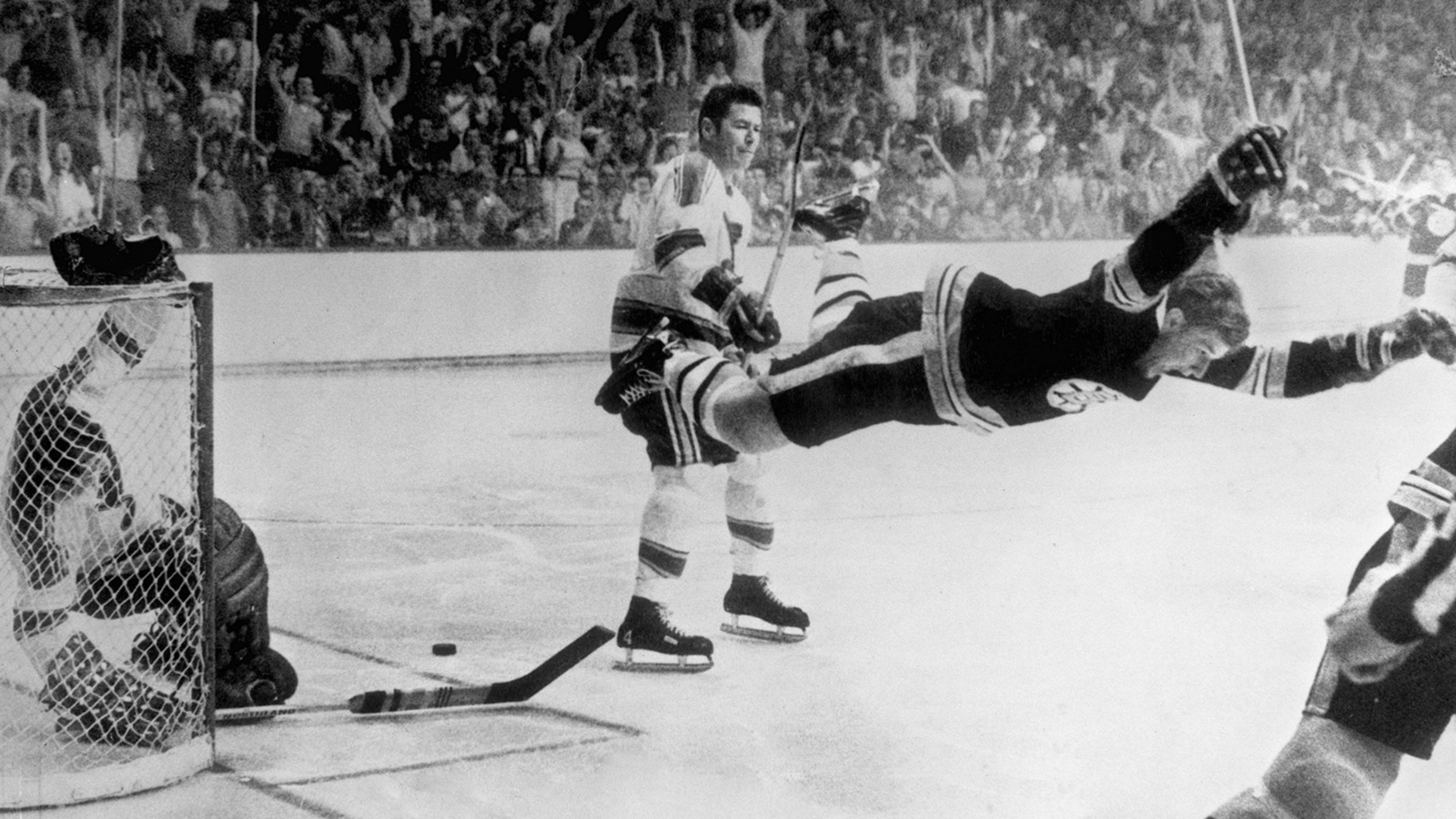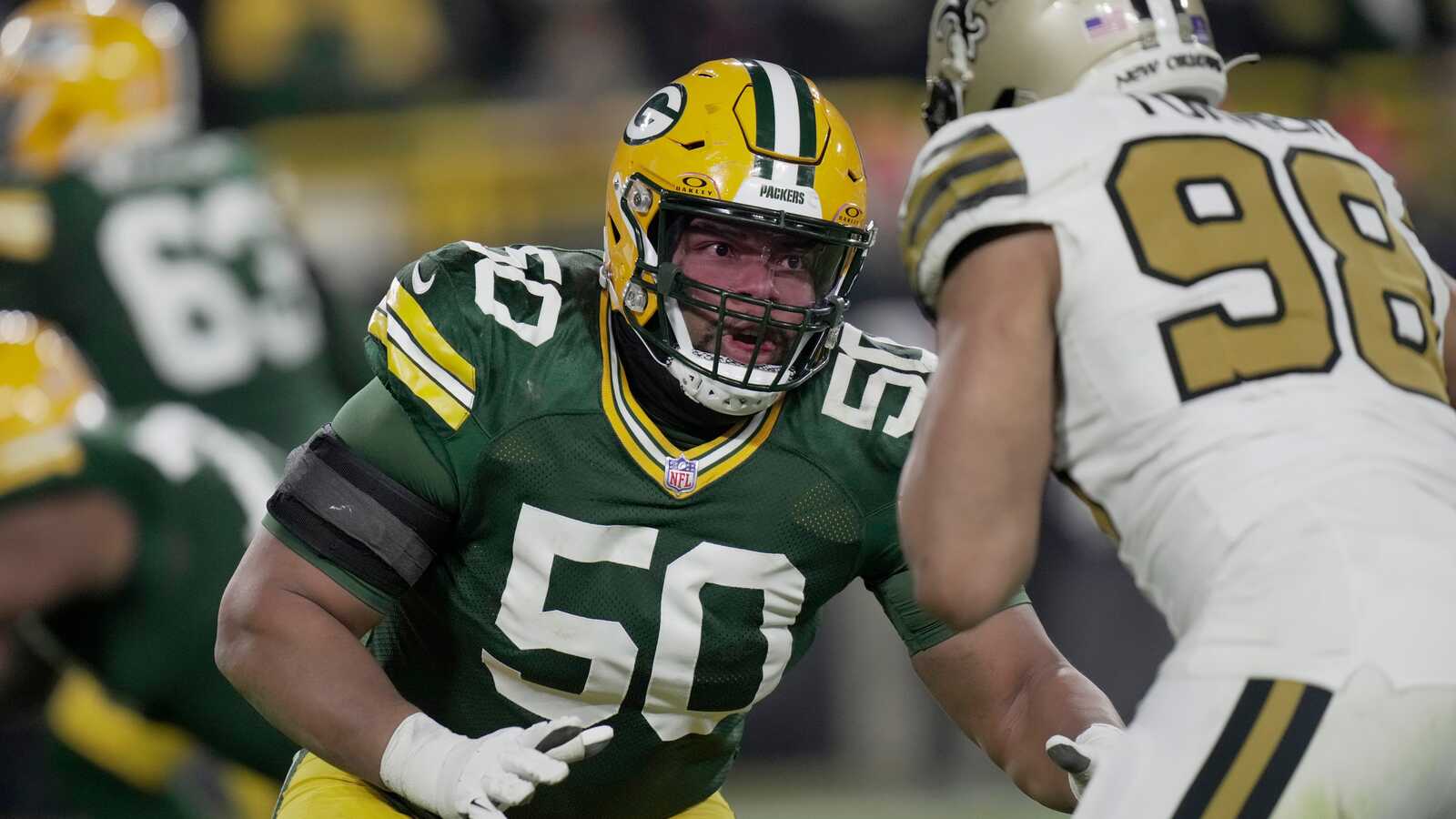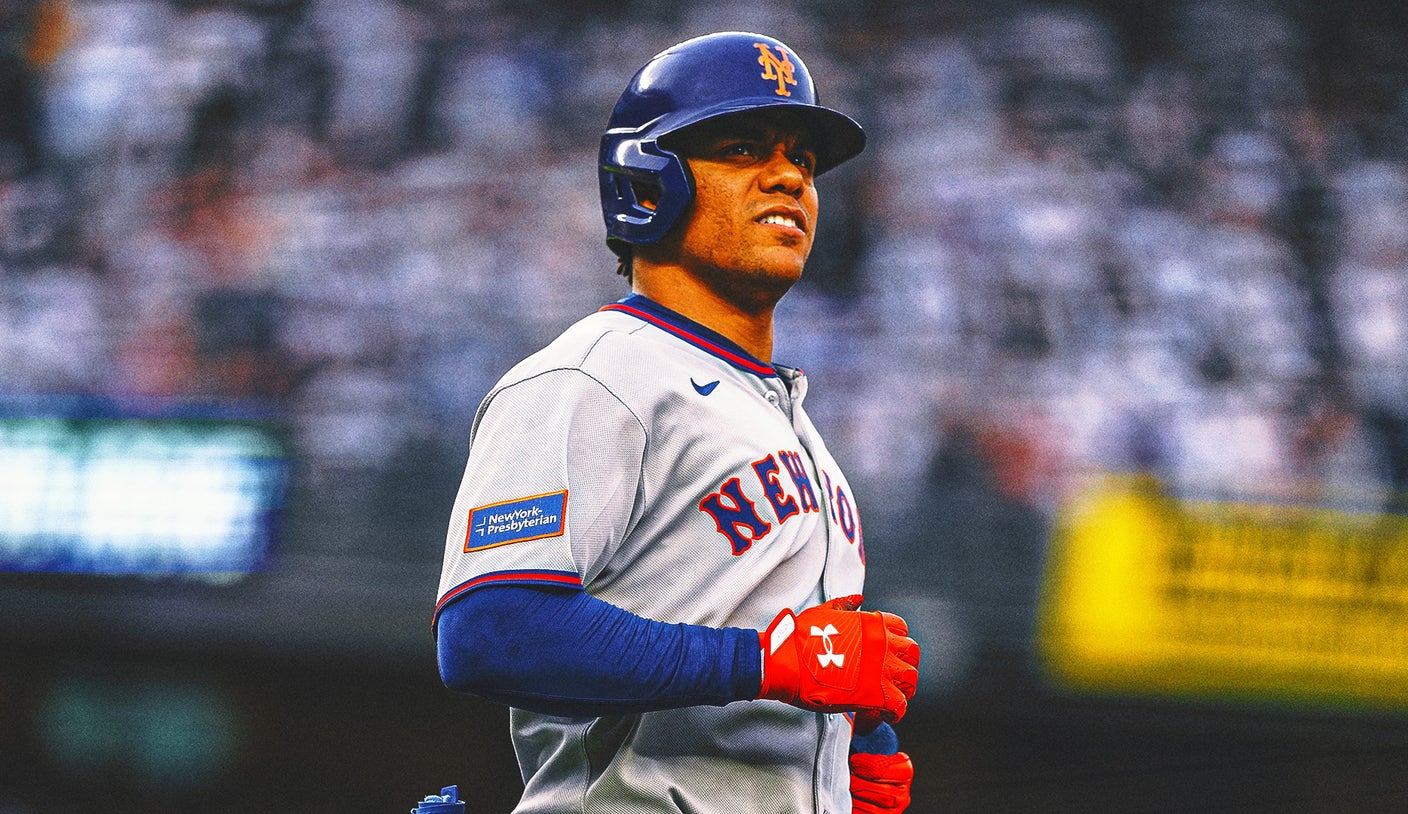Coming through in the biggest moment(s) of the biggest game of the season is often the stuff dreams are made of. Here are some of the best, in chronological order, when it comes to Stanley Cup-clinching contests.
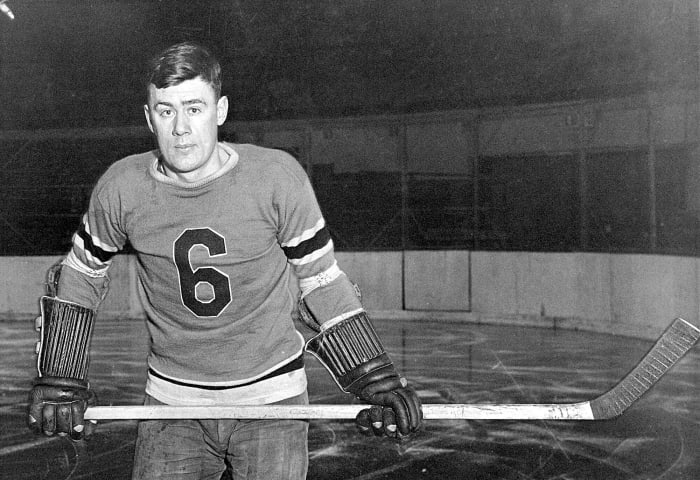
Bruce Bennett Studios via Getty Images Studios
Back when the Stanley Cup Final was decided in five games. The Rangers needed four games to beat the Toronto Maple Leafs, but there certainly was some drama. In the decisive Game 4, the only goal scored came via Hall-of-Famer Cook, who spent all of his 11 NHL seasons with the Rangers, at 7:33 into overtime. It was the first time the Cup was decided with an overtime goal.
2 of 25
Bryan Hextall, New York Rangers, 1940
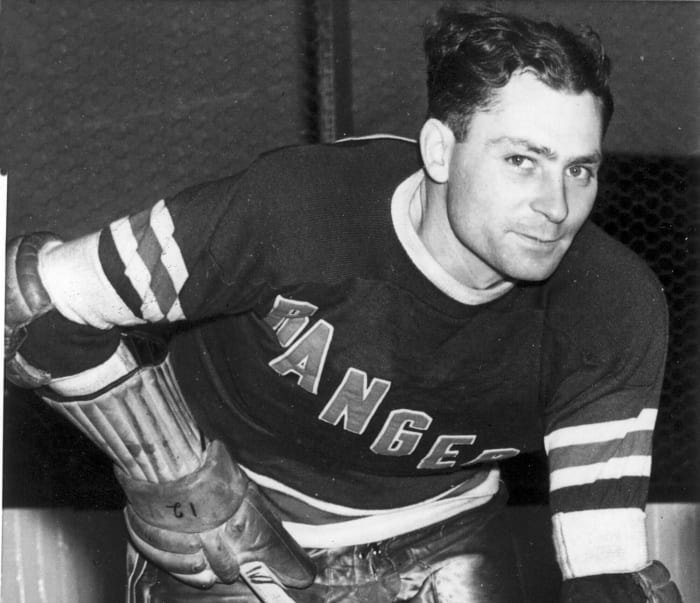
Bruce Bennett Studios via Getty Images Studios
After knocking off the Maple Leafs to win it all in ’33, the Rangers didn’t hoist the Cup again until 1940. And, once again, they needed an overtime goal to beat Toronto in the series clincher. With the Stanley Cup Final now a best-of-7, New York took a 3-2 series lead with its 2-1, double-overtime victory in Game 5. Then, at Toronto for Game 6, Hall-of-Famer Hextall, grandfather of NHL great Ron Hextall, came through with the winner just 2:07 into the extra session. It would be 54 years until the Rangers won their next Stanley Cup.
3 of 25
Sweeney Schriner, Toronto Maple Leafs, 1942

Toronto Maple Leafs
Toronto’s run of five Stanley Cup triumphs in nine seasons began here. It was fitting that the Leafs’ historic comeback from 3-0 down in the 1942 Stanley Cup Final again meant coming from behind to win Game 7. Though Toronto was playing at home and armed with plenty of momentum after winning three straight to tie the series, Detroit struck first with Syd Howe’s goal early in the second period. However. the third belonged to the Maple Leafs, and Schriner, started and capped the rally with goals that sandwiched Pete Langelle’s score for a 3-1 victory.
4 of 25
Walter “Babe” Pratt, Toronto Maple Leafs, 1945
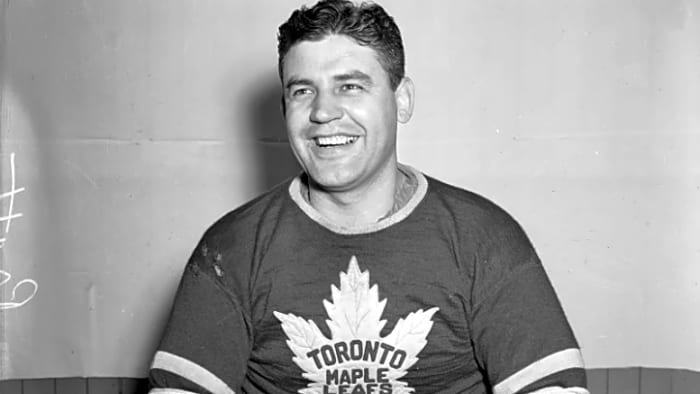
National Hockey League
As noted, the Maple Leafs overcame a 3-0 hole to stun the Detroit Red Wings three years earlier. Toronto almost returned the favor in ’45. The Leafs posted three straight shutouts to open their own 3-0 lead in this series, but Detroit regrouped and posted two shutouts of its own to win the next three. However, the Maple Leafs were able to stop the bleeding in Game 7 at Detroit. Detroit’s Murray Armstrong tied the game with a goal 8:16 into the third period, but Babe Pratt, considered one of the greats to ever play the game, broke the tie for the Leafs with a little less than eight minutes to play in regulation, scoring via the power play.
5 of 25
Pete Babando, Detroit Red Wings, 1950
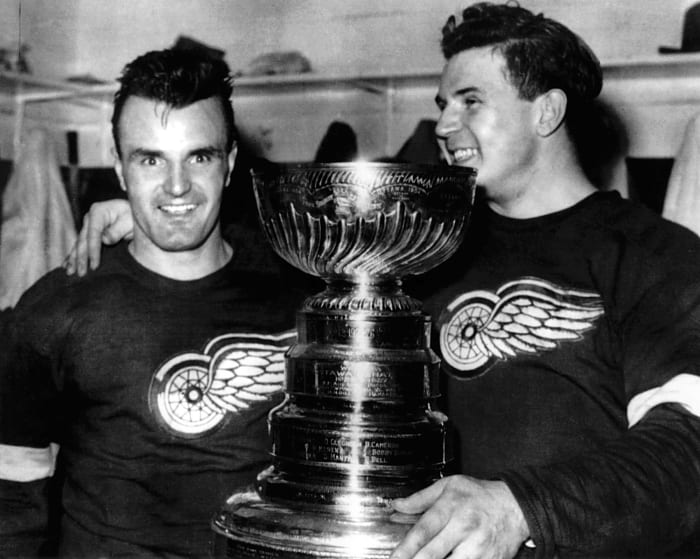
B Bennett/Getty Images
One overtime was not enough to decide the winner of the 1950 Stanley Cup Final. It’s possible the greatest Game 7 in Cup Final history was played that year. The New York Rangers led 2-0 after one period, but three second-period goals from the Red Wings left the game tied 3-3 after two periods and ultimately at the end of regulation and the first overtime. Entering the contest, Babando didn’t score in the playoffs, but his second goal of the game, at 8:31 into the second extra session, proved to be one of the most memorable goals in Red Wings’ history.
6 of 25
Tony Leswick, Detroit Red Wings, 1954
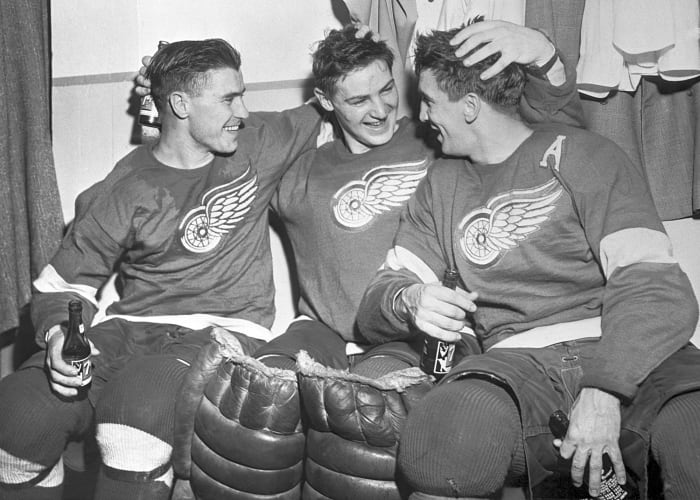
Bettmann/Contributor/Getty Images
Detroit is the only team in NHL history to win the only two Stanley Cup Final series that went to an overtime Game 7. The last time that happened was 1954, against the Montreal Canadiens. Tied 1-1, just 4:29 into overtime, Leswick’s shot deflected off the glove of Canadiens defenseman Doug Harvey, and in for the winner. Though Leswick’s winner made him a Wings legend, what is likely most remembered about that game was the disgruntled Montreal players skating off the ice without taking part in the traditional post-series handshake.
7 of 25
Henri Richard, Montreal Canadiens, 1966
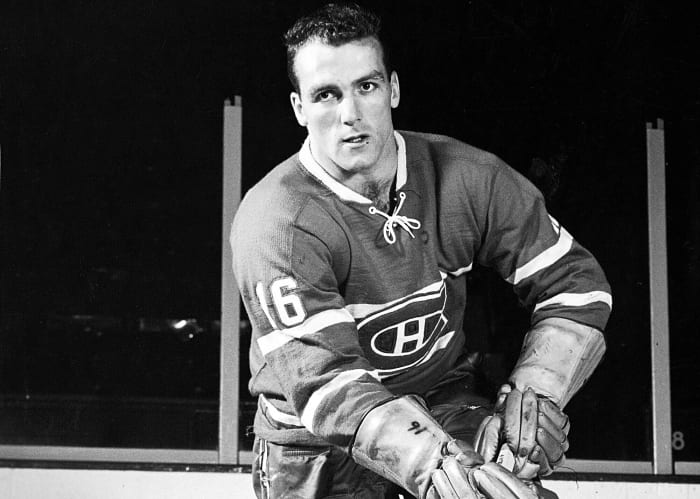
Bruce Bennett Studios via Getty Images
This won’t be the first time we’ll highlight the iconic Richard’s stellar play in the Stanley Cup Final. The fifth time Montreal and Detroit played for the Cup, Richard proved to be the difference. After the Canadiens dropped the first two games, they win the next four to hoist the Cup. However, their 3-2 victory in Game 6 did not come without controversy. Richard scored just 2:20 into overtime when he lost his footing while surging toward the net with the puck, which made it over the goal line as he slid into Wings netminder Roger Crozier. Detroit claimed Richard pushed the puck in with his hand, but the protest fell on deaf ears, and Montreal continued its Stanley Cup dominance.
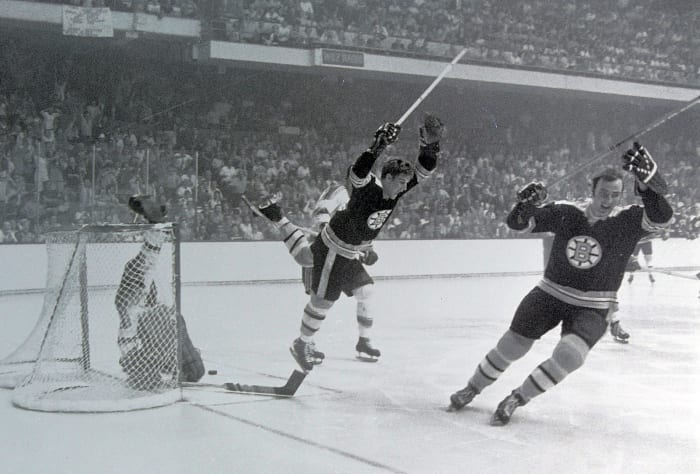
B Bennett/Bruce Bennett Studios via Getty Images
The Bruins swept the St. Louis Blues to win their first Stanley Cup in nearly 30 years in 1970. However, the way in which Boston capped the achievement remains one of the most lasting images in all of sports. Just 40 seconds into overtime of Game 4, at the famed Boston Garden, Bruins legend Orr skated into the slot, then slipped the puck past St. Louis netminder Glenn Hall for the Cup-winning goal. Attempting to celebrate with his arms in the air, Orr was tripped by Blues defenseman Noel Picard, and went flying into the air with arms and stick stretched out. A celebratory moment for the ages.
9 of 25
Henri Richard, Montreal Canadiens, 1971
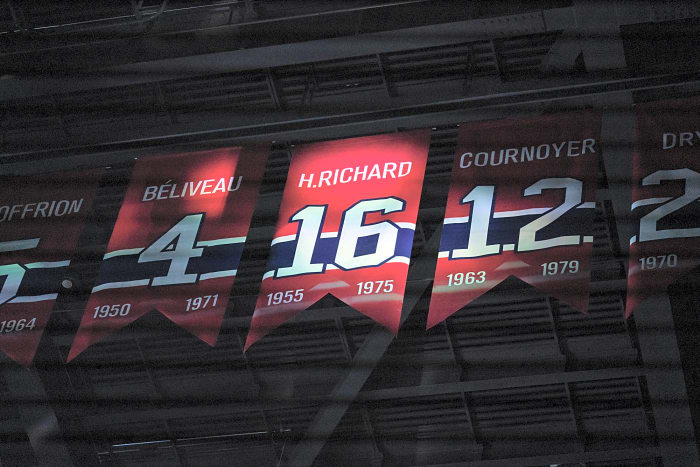
Vincent Ethier/Icon Sportswire via Getty Images
The first of two notable overall moments from the famed 1971 Final between Montreal and Chicago, which needed seven games to decide. Prior to Game 7 of the ’71 series, the home team won each of the previous six. That changed this time. The host Blackhawks opened the scoring on Dennis Hull’s goal late in the first. Chicago made it 2-0 through Danny O’Shea at the 7:33 mark of the second. But, Montreal countered with goals from Jacques Lemaire and the legendary Richard late in the second. Then, Richard struck again with the eventual game-winner just 2:34 into the third, and the Canadiens’ dominance continued.
10 of 25
Ken Dryden, Montreal Canadiens, 1971
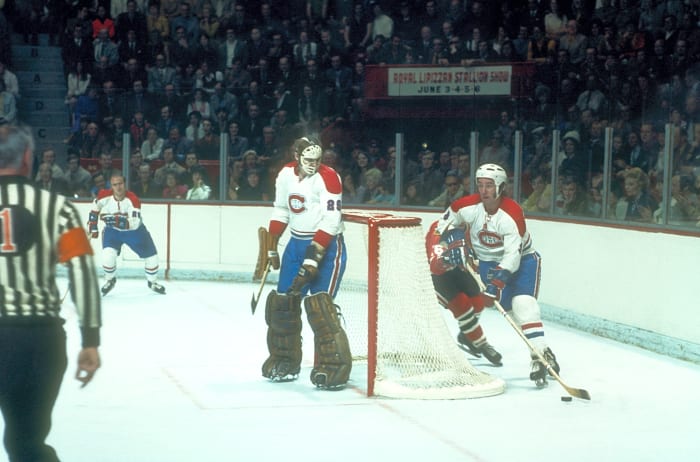
Bruce Bennett Studios via Getty Images
Dryden’s performance during the 1971 playoffs essentially made him an instant franchise legend. Dryden made his NHL debut in March of that season and posted a 1.65 goals-against average to win all six games he played down the stretch. Dryden then got the call — over Rogie Vachon — in the playoffs, and earned star status while posting a 2.25 goals-against-average in the final nine games of the postseason. In Game 7, Dryden stopped 31-of-33 shots to finish his brilliant playoff run and win the Conn Smythe Trophy as postseason MVP.
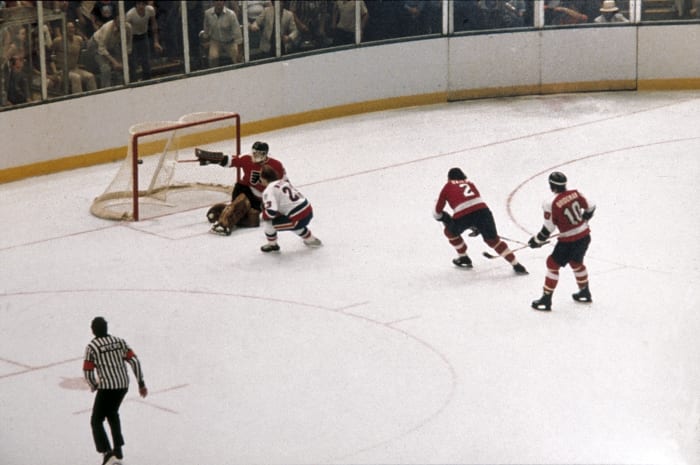
Bruce Bennett Studios via Getty Images Studios
During the 1980 Stanley Cup Final between the Islanders and Philadelphia Flyers, the teams combined for 51 goals. And, New York’s 5-4 Cup-clinching Game 6 victory was arguably the most exciting. With the game tied 2-2 after a period, New York scored twice in the second for a 4-2 lead, but Philadelphia recorded two of its own in the third to tie the contest. It went to overtime, where third-liner Nystrom pushed the puck by Flyers goalie Pete Peeters off a perfect cross-slot pass from John Tonelli to give the Islanders the first of four straight Stanley Cups.
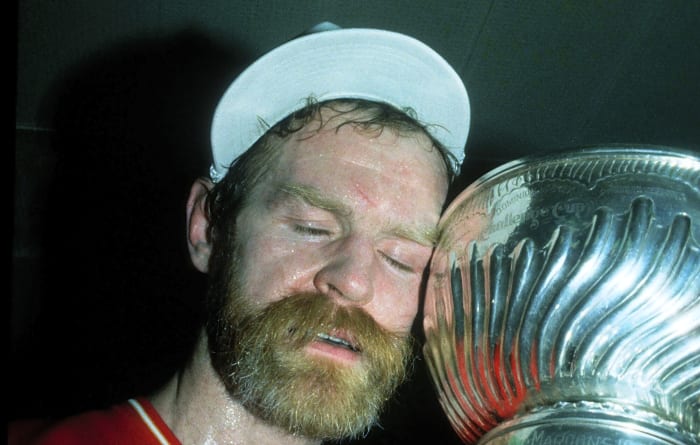
Bruce Bennett Studios via Getty Images Studios
Hall-of-Famer Lanny McDonald concluded his exceptional NHL career in style by helping the Flames win the franchise’s first Stanley Cup in 1989. McDonald totaled just 18 points in 51 games during the 1988-89 campaign — his 16th in the league — and was a healthy scratch for Games 3, 4 and 5 of the Stanley Cup Final versus Montreal. However, he was inserted into the Flames’ lineup for Game 6. With his team ahead 3-2 in the series, McDonald scored the tiebreaking goal 4:24 into the second period, causing the home crowd to erupt. Calgary never relinquished the lead, won 4-2 and McDonald hoisted the Cup in storybook fashion.
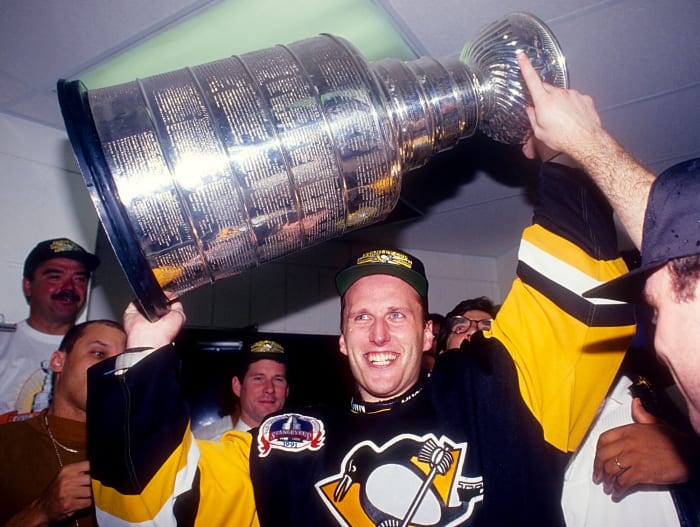
B Bennett/Getty Images
Pittsburgh’s Stanley Cup-clinching, Game 6 8-0 rout of the Minnesota North Stars in 1991 was far from competitive. However, the veteran Barrasso had a lot to do with the outcome. The former Calder and Vezina Trophy winner delivered a stellar 39-save performance during the Cup-clinching 8-0 rout. Perhaps most impressive is that Barrasso was questionable for Game 6 after he exited the previous contest due to a groin injury. Barrasso would go on to help the Penguins repeat as Stanley Cup champions in 1992.
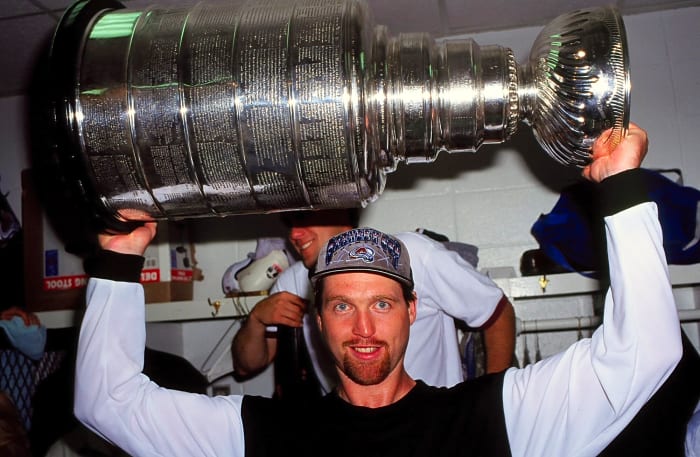
Steve Babineau/NHLI via Getty Images
Sure, the Avalanche swept Florida to win the franchise’s first Stanley Cup in 1996, but Game 4 of that series remains one of the great tests of endurance in all sports. Uwe Krupp’s goal 4:31 into the third overtime ultimately gave Colorado a 1-0 victory and the franchise’s first Cup, and remains a seminal moment in franchise history. But, the play of Roy, who made a remarkable 63 saves in the clincher, and allowed just four goals on 151 shots faced during the series, is the stuff legends are made from.
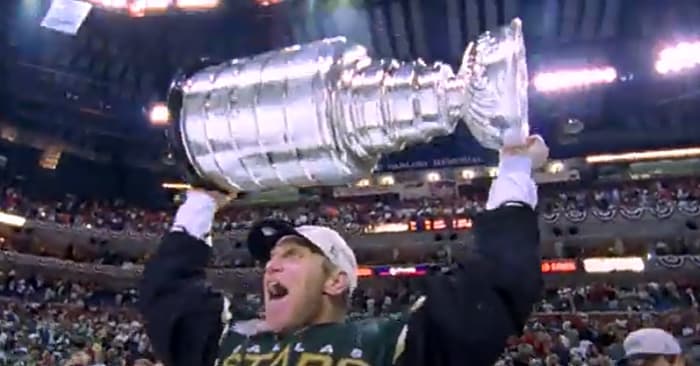
YouTube
The decisive Game 6 of the 1999 Final will forever be remembered for Brett Hull finally winning the first of his two Stanley Cups. Yet, this one came with plenty of controversy. The game featured 104 shots but just three goals, and Hull’s winner came at 14:51 of the third overtime — the longest Final contest to decide the Cup. The replay showed that his skate was in the crease while pushing the puck past Buffalo netminder Dominik Hasek (48 saves) amid a net-front scrum. However, the officials claimed Hull kept possession and the goal stood . A thrilling moment for the Hall-of-Famer and Stars fans, while yet more heartbreak for the Cup-hungry Sabres franchise.
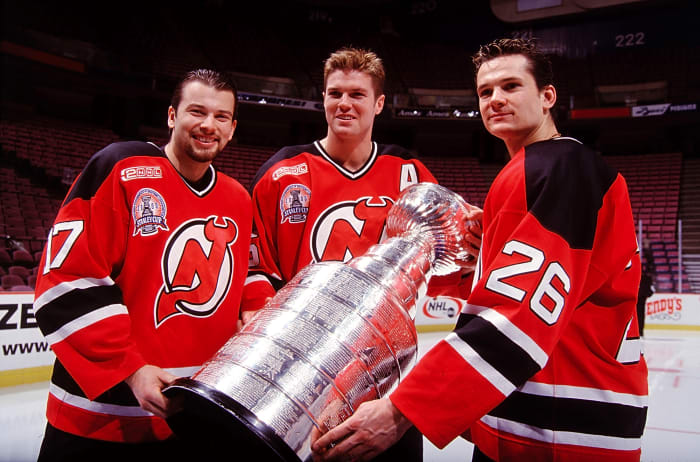
Bruce Bennett Studios via Getty Images
Fresh off a triple-overtime classic from Game 5, won 1-0 by Dallas on the road, New Jersey still had a chance to raise the Cup in Game 6 on the road. Of course, it wouldn’t be easy, and the Devils needed two more overtimes to prevail. All the regulation scoring came in the second period. Then, at 8:20 into the second extra session, dependable assistant captain Arnott one-timed the Devils to a 2-1 victory and their second Stanley Cup triumph.
17 of 25
Mike Rupp, New Jersey Devils, 2003
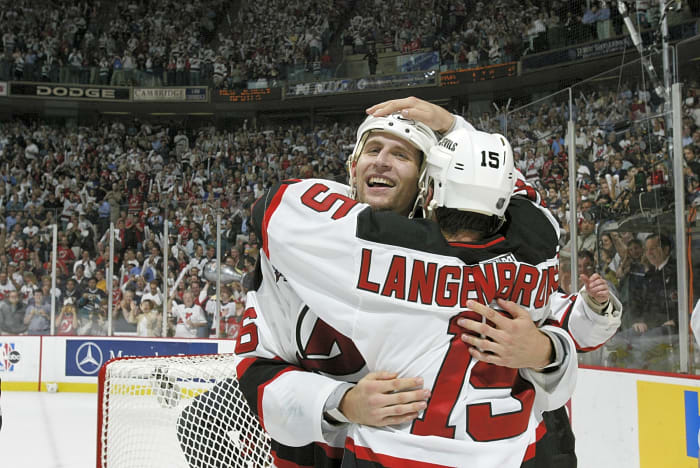
Elsa/Getty Images/NHLI
Sometimes Stanley Cup heroes are of the under-the-radar variety. After debuting with five goals in 26 games of the 2002-03 season, Rupp struggled down the stretch and was left off the Devils’ postseason roster until the Stanley Cup Final against Anaheim. He then became a Devils icon by etching himself in Stanley Cup Final lore for recording three points in New Jersey’s 3-0 victory in Game 7. That included the game’s opening goal early in the second period, which still leaves Rupp as the only player in NHL history whose first career-playoff goal was also the Stanley Cup winner.
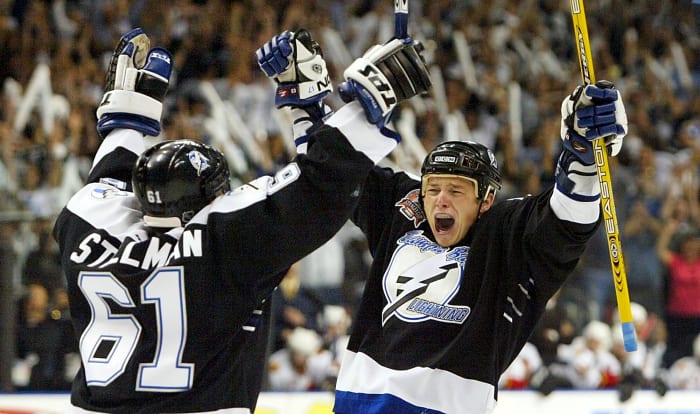
Dave Sandford/Getty Images
The Lightning’s moment of glory in winning the franchise’s first Stanley Cup concluded with one of the tensest Game 7’s in league history. An unlikely hero, Fedotenko scored in each of the first two periods to give the Lightning a 2-0 lead. However, the drama was amped up when Calgary’s Craig Conroy scored roughly midway through the third, and things got even more chaotic as the Flames pressured Nikolai Khabibulin the rest of the way. However, Tampa Bay survived to raise the Cup, becoming the southernmost NHL club to win it all. Meanwhile, the unassuming Fedotenko became a Stanley Cup legend.
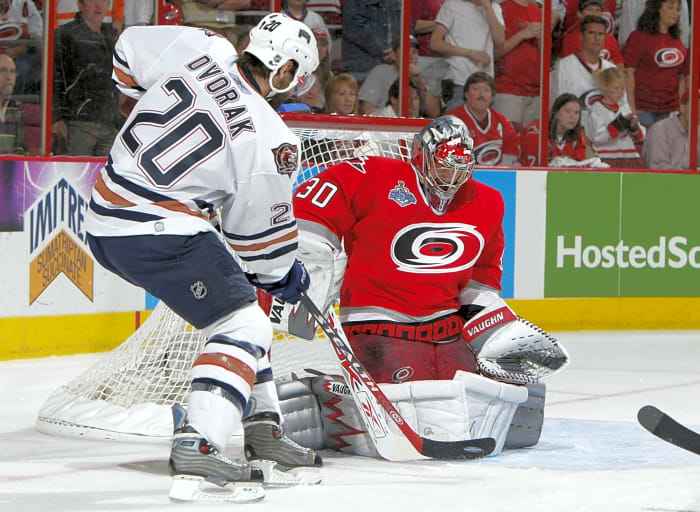
Dave Sandford/Getty Images
Ward was a major reason the Hurricanes made their impressive run to the franchise’s first Stanley Cup triumph in 2005-05. He registered a 2.14 goals-against-average and .920 save percentage while tying an NHL then-playoff record with 15 wins by a rookie goaltender, as well as two shutouts. Ward posted a 2.28 GAA and one of those shutouts during Carolina’s Stanley Cup Final versus Edmonton. He then saved the best for last by stopping 22-of-23 shots in the Canes’ 3-1 Game 7 victory.
20 of 25
Max Talbot, Pittsburgh Penguins, 2009
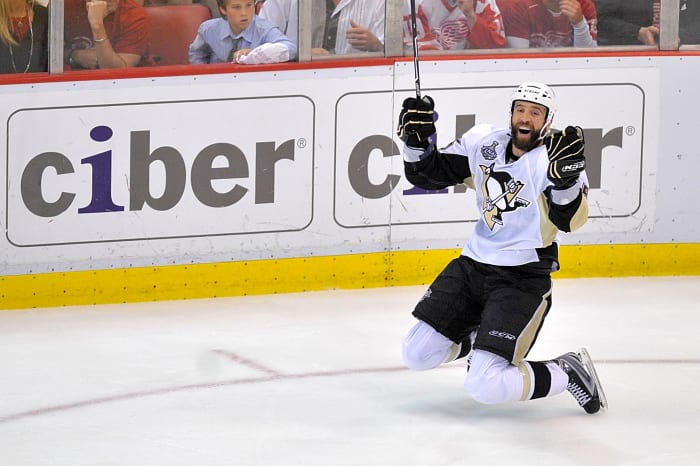
Jamie Sabau/Getty Images
Talbot was the consummate teammate and excellent on the penalty kill during his 11-year NHL career. Amid that career, Talbot recorded just seven multi-goal games, but three of those came during the postseason, including two during the Penguins’ 2009 Stanley Cup Final against the Detroit Red Wings. Talbot, who posted 13 points in 24 playoff contests that season, became a Pittsburgh legend when he did all the scoring in the Penguins’ 2-1 Game 7 win at Detroit.
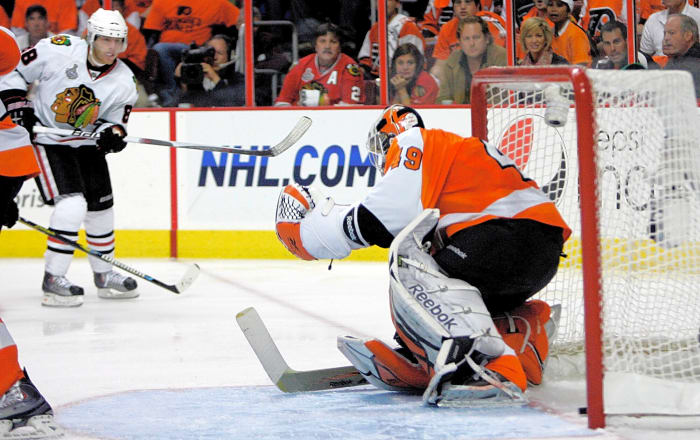
Jerry Lai/Imagn Images
Chicago held a 3-2 series edge in 2010 but knew it would be tough trying to close things out in Game 6 at Philadelphia, where it lost Games 3 and 4. The Blackhawks trailed 2-1 near the midway mark of the second period when Patrick Sharp tied the game and Andrew Ladd put them ahead later in the frame. However, the Flyers tied it at 3-3 through Scott Hartnell’s goal with roughly four minutes left in regulation. Yet, with a 49-year Cup drought on the line, Chicago came through 4:06 into overtime. Patrick Kane slipped the puck past Philadelphia netminder Michael Leighton and under the bottom padding inside the net. But, only Kane seemed to realize it went in and broke out into celebration while Flyers players, fans, and even some of his own teammates wondered if the game had actually ended.
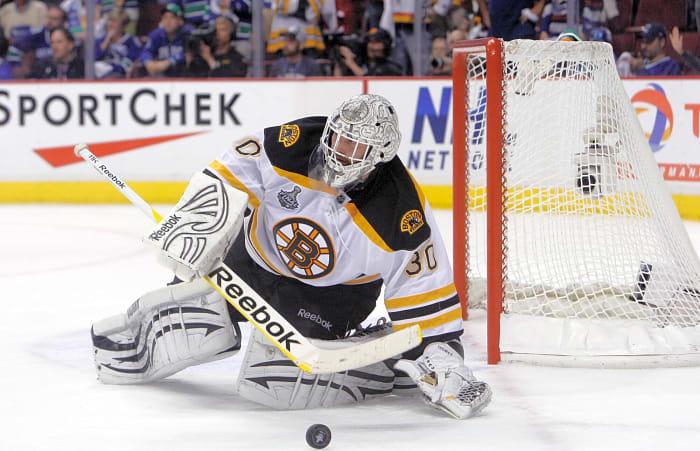
Jerry Lai/Imagn Images
It’s hard to believe that Boston didn’t participate in a Stanley Cup Final Game 7 until 2011. However, the Bruins certainly made a stellar first impression, with Vezina Trophy-winner Thomas leading the way in their 4-0 victory over a talented Vancouver squad — on the road. The 37-year-old Thomas stopped all 37 shots he faced to become the first goaltender to record a road shutout in a Game 7 of the Final. He also earned the Conn Smythe Trophy (the oldest player in NHL history to do so) while posting an impressive 1.98 goals-against average during the playoffs.
23 of 25
Bryan Bickell and Dave Bolland, Chicago Blackhawks, 2013
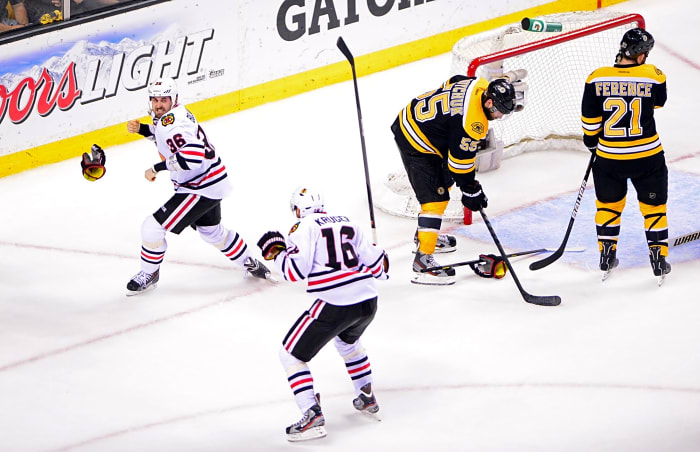
Michael Ivins/Imagn Images
The Blackhawks trailed their 2013 Cup final with Boston 2-1, then turned things around with back-to-back victories to set up a clinching opportunity in Game 6 at Boston, However, the Bruins broke a 1-1 tie through Milan Lucic‘s goal with 7:49 remaining in regulation. As the clock ticked down, it appeared Boston would hold on to force a Game 7 back in Chicago. The Blackhawks, however, thought otherwise thanks to the greatest 17 seconds in the history of the franchise. First, Bickell tied it with 1:16 left in the third on a pass from Jonathan Toews. Then, Bolland, with 58.3 seconds to go and from a rebound off the post, positioned himself to score the go-ahead goal, and, jettisoning his gloves in celebration, that gave Chicago its second Cup in four years.
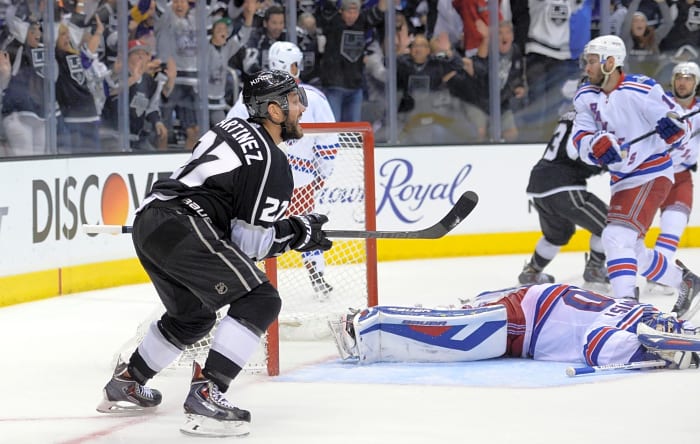
Gary A. Vasquez/Imagn Images
Martinez has long been one of the NHL’s top defensemen, and his breakout season came with 11 goals and 11 assists in 61 games for the Kings in 2013-14. During that postseason, Martinez posted five goals with five assists, including the overtime, series-clinching goal against Chicago in the Western Conference Finals. Martinez had just one point in the Final versus the New York Rangers, but it’s arguably the most memorable score in club history, a rebound goal with 5:17 remaining in the second overtime of Game 5 to secure the Cup with a 3-2 Kings triumph.
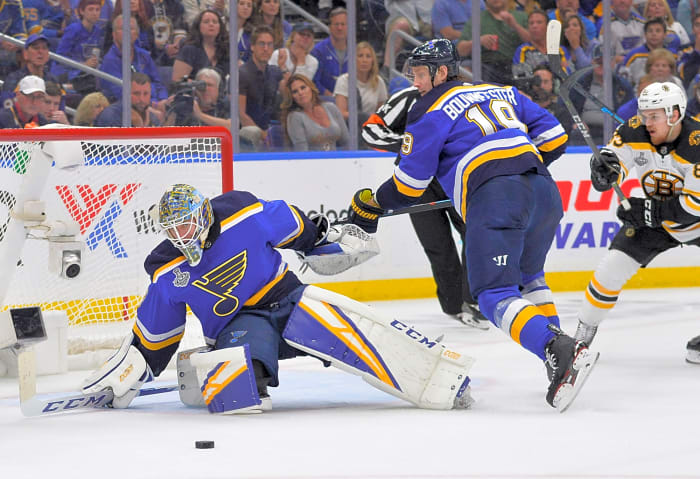
Jeff Curry/Imagn Images
Binnington was called up by the Blues in December 2018 and won 24 times in 32 appearances — while posting a stellar 1.89 goals-against-average– the rest of the regular season. Although Binnington wasn’t nearly as dominant in the playoffs, he did set the NHL rookie record with 16 postseason wins and had a 2.46 goals-against average (GAA). He allowed nine goals in the final four games of the Stanley Cup Final, and delivered a brilliant 32-save effort in the Blues’ 4-1 win at Boston in Game 7.
